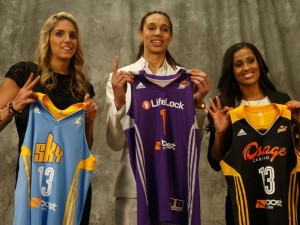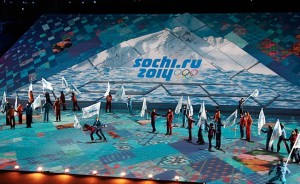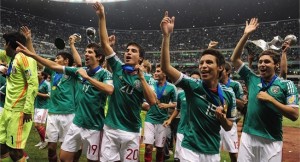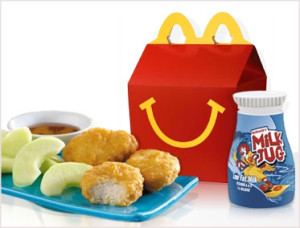This week in the #SportsBiz, top news includes the upcoming Winter Olympics in Sochi. Other top stories include the WNBA seeing better ratings than the MLS, McDonalds rolling out NFL Rush Zone Happy Meals and a large amount of money riding on Mexico’s playoff against New Zealand. Stay trendy with some of the top stories below.
Sports Business
Sochi Winter Olympics will be most expensive in history
 The Athens Olympic Games cost a staggering $15 billion dollars in all. But when mentioned next to the Sochi Games, Athens is dwarfed. What was originally expected to cost $15 billion will now come in around $50 billion, making it the most expensive Olympics in history.
The Athens Olympic Games cost a staggering $15 billion dollars in all. But when mentioned next to the Sochi Games, Athens is dwarfed. What was originally expected to cost $15 billion will now come in around $50 billion, making it the most expensive Olympics in history.
According to Robert Barney, founding director of the International Centre for Olympic Studies at the University of Western Ontario, Canada, no Olympic Games in history have made it into the black. Scott Minto, director of the Sports Business MBA program at San Diego State University, explained a recurring issue:
“The problem is they don’t see the issues that come eight or 10 years out after they actually host them. The politicians who pushed for the games are long gone and don’t have to face the problems of cost overrides and empty stadiums that aren’t being used after the games end.”
Of course one of their goals of hosting the Winter Olympics is to expose the world to Russia’s culture and bring in tourists. But how many people will continue traveling to Sochi after the games have concluded? Arthur Fleisher, professor of economics at Metropolitan State University of Denver, compared the upcoming Games to Athens:
“You’re building these stadiums and places to go, but who goes to them after the fact? Look at Athens. Most of the facilities there are in bad condition and unused and they cost hundreds of millions to maintain.”
A report by an opposition leader in Russia claims that building the new Olympic Stadium in Sochi will cost $19,000 per seated fan, as opposed to the average cost per fan in previous games of $6,000. While this is a huge difference, an idea of rotating between a few host cities has been raised. If five or six host cities would rotate hosting responsibilities, the Games would be better able to “recycle” and reuse stadiums and other structures built for the Olympics. It seems Sochi may have dug itself a hole.
You can read more here.
Photo credit – snowbrains.com
Sports Media
WNBA conquers MLS in ratings
 It appears the MLS may be struggling a bit with its ratings. One league that isn’t particularly struggling in that category is the WNBA.
It appears the MLS may be struggling a bit with its ratings. One league that isn’t particularly struggling in that category is the WNBA.
The SBJ says that MLS’ average numbers on ESPN/ESPN2 (220,000) and NBC Sports Network (112,000) were lower than NCAA Softball games, IndyCar races, the X Games and even the Solheim Cup (an international golf tournament that was televised last August on the Golf Channel). A finger may point to the MLS’ weekend match-ups, which primarily fall outside of primetime hours.
While last year was a down year for the WNBA (180,000 viewers on average), viewers this year have increased by 28 percent. SBJ reports ESPN backed its commitment to the league in March, signing a six-year extension worth $12 million per year for WNBA rights. The contract allocates $1 million for each WNBA team. Norby Williamson, ESPN’s executive vice president of programming and acquisitions, was happy about the deal:
“The ratings of the WNBA on ESPN and ESPN2 have consistently shown that they draw a strong, loyal audience. Given the competitive landscape, I think most networks would be celebrating some of the results, if they could get to the numbers that we’re getting with some of their properties.”
Adjacently, MLS has deals with ESPN (eight years, $64 million from 2006), NBC (three years, $30 million from 2011) and Univision (eight years, $80 million from 2006) for U.S. broadcasts. The only problem is, they may be lacking the loyal audience that the WNBA has attained. Or perhaps it’s a failure to fully market their stars.
You can read more here and here.
Photo credit – womenplayball.com
Social Media In Sports
Winter Olympics in Sochi will allow social media use
 Journalists using social media seems to be one of the major topics heading into the Winter Olympics in Sochi. It appeared that Sochi was going to crack down hard on journalists using social media to post pictures of the events. For instance:
Journalists using social media seems to be one of the major topics heading into the Winter Olympics in Sochi. It appeared that Sochi was going to crack down hard on journalists using social media to post pictures of the events. For instance:
Vasily Konov, head of the state-run R-Sport news agency, which controls accreditation at February’s games, told a seminar for sports journalists on Friday that print reporters using any sort of multimedia would be “considered a serious violation and lead to their accreditation being canceled,” several Russian outlets reported. Only journalists with professional equipment and special badges will be allowed to do so.
New reports have now surfaced that seem to be quite contrary. International Olympic Committee spokesman Mark Adams confirmed to For The Win in an email on Monday:
“Please take as many photos as you like! Sharing pix on social media positively encouraged.”
The major concern has been over using social media to upload video content. Actions as such are prohibited due to restrictions from the sale of the Games’ broadcast rights. The official social rules and guidelines of the Winter Olympics in Sochi state the following:
Accredited media may freely utilize social media platforms or websites for bona fide reporting purposes. Photos taken by accredited photographers may be published for editorial purposes on social media platforms or websites in accordance with the Photographers Undertaking. The Olympic symbol – i.e. the five interlaced rings, which is the property of the IOC – can be used by accredited media for factual and editorial purposes, for example in a news article covering the Olympic Games. All other provisions of these Guidelines apply.
There seems to be a grey area between the two conflicting reports.
Photo credit – dailytech.com
Sports Sponsorship
Sponsors and partners hinge on Mexican National Team
 Mexico’s World Cup berth hinges on a playoff against New Zealand. If Mexico fails to win, an estimated $600 million will be lost, not only affecting the team, but sponsors and investors as well.
Mexico’s World Cup berth hinges on a playoff against New Zealand. If Mexico fails to win, an estimated $600 million will be lost, not only affecting the team, but sponsors and investors as well.
Sponsors like Adidas, the provider of Mexico’s team jerseys, are at risk of losing a good stake of jersey sales and brand awareness if Mexico fails to advance. Other brands that stand to lose from a Mexico loss to New Zealand are Coca-Cola, Banamex and Movistar, all of which hold four-year sponsorship deals with the team.
Mexican Football Federation Justino Compean states that revenue during the World Cup cycle, between marketing, sponsorships and television rights, can total to upwards of $250 million. That’s a large chunk of change riding on a playoff.
Broadcasting rights are also riding on a win from Mexico. Games obviously cannot be shown if the team fails to qualify for the World Cup. A situation as such would result in broadcasting companies returning money to advertisers. Rogelio Roa, the director of sports marketing firm based out of Mexico City DreaMatch Solutions, told ESPN:
“I would say that the atmosphere between all the stakeholders and sponsors, it’s about doubts, it’s about uncertainty and it’s about questions. No one would have suspected that, at this point, Mexico wouldn’t have a spot in the World Cup.”
You can read more here.
Photo credit – mexicotoday.org
Sports Marketing
McDonalds launches NFL Rush Zone Happy Meals
 Last Fall, McDonalds and the NFL signed a multi-year, multi-million dollar deal for the restaurant to become an official sponsor of the league. Now, kids are getting a glimpse of the sponsorship first-hand, with the release of the NFL Rush Zone Happy Meals.
Last Fall, McDonalds and the NFL signed a multi-year, multi-million dollar deal for the restaurant to become an official sponsor of the league. Now, kids are getting a glimpse of the sponsorship first-hand, with the release of the NFL Rush Zone Happy Meals.
Mr. Peter O’Reilly, the NFL’s VP-fan strategy and marketing, explained the importance:
“For us, kids are a major priority, especially kids in that 6-13 window. That’s why we launched ‘Rush Zone’ in the first place. This now takes it to another level.”
The partnership encompasses McDonalds “better for you” Happy Meals, and runs in line with the NFL’s above mentioned animated series “Rush Zone”, which is aired on Nickelodeon. In promotion of the launch of the new Happy Meals, McDonalds is running an extensive ad campaign which covers TV, print, online, and in-store displays.
McDonalds said in s recent statement:
“We have elevated our partnership with the NFL this year with the integration of our Mighty Wings Campaign, NFL Runner Digital App, NFL McDonald’s Arch Card, and NFL Pocket Schedules to bring the fun and excitement of the NFL to our customers. The Rush Zone Happy Meal allows our youngest customers to get into the action.
You can read more here.
Photo credit – lilsugar.com



Outstanding post, you have pointed out some good details.